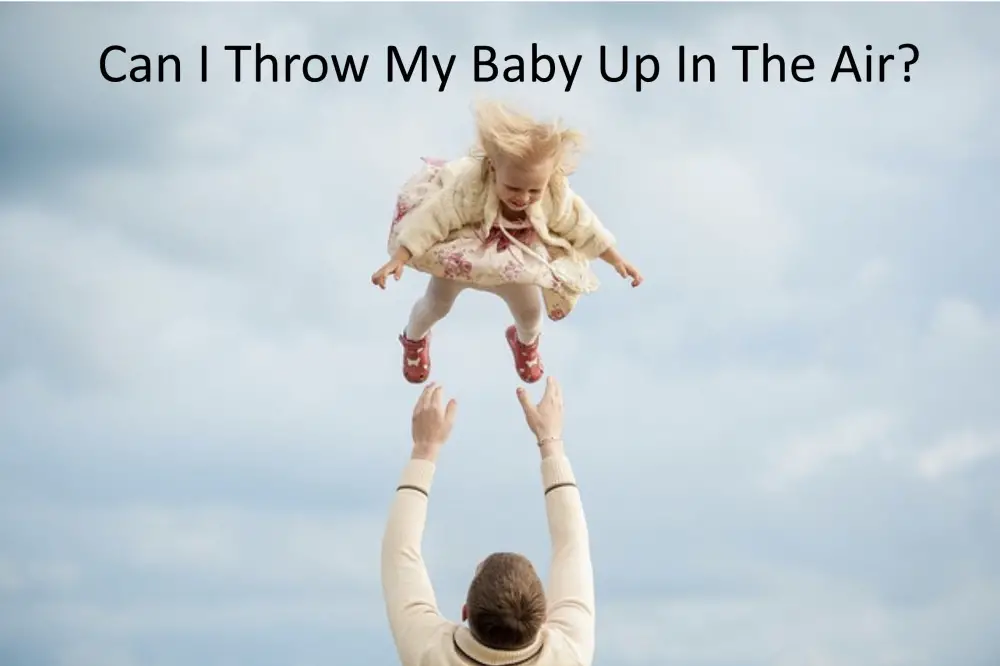Can I Throw My Baby Up In The Air? (5 Major Reasons Why You Shouldn’t Do It!)

We all love to make babies laugh and squirm with joy.
Often, we will do whatever it takes to see this gorgeous gummy smile on the little one’s face.
One of the common ways to do that is by tossing your baby up in the air and catching it back.
But have you considered whether this play is safe for your baby?
Here are 5 factors you should consider when playing toss and catch with your baby.
Tossing a baby in the air can be a fun and playful activity. But it can also be dangerous. Infants have weak neck muscles that cannot properly support their enormous heads and an underdeveloped nervous system, which makes them very vulnerable to injuries. So, throwing a baby in the air can cause serious harm, such as shaken baby syndrome, brain damage, fractures, or even death. It is important to always handle babies gently and with care.
Throwing A Newborn Baby Up In The Air – Okay or Not Okay?
It will surprise none of you to hear that tossing your baby up in the air is a HARD NO-GO.
We are told that when they are born, we must handle them gently as if they were eggs!
We support their head and neck when picking them up and holding them; we cuddle them, gently stroke them, and give them skin-to-skin time or a soothing baby massage.
We also ensure our babies are securely fastened in the baby carrier, pushchair, car seat, etc.
In other words, our job is to limit any activity that can be too rough and bouncy and that can make their unsupported head whip back and forth.
Such activities are not only causing discomfort to your tiny baby but pose a significant risk to their safety.
Believe me – for rough play, there will be time later. But for the moment -just refrain from doing it.
Here is why.
Why Throwing A Newborn Baby Up Is Not Safe?
In simple terms – because they are not physically or emotionally ready for any form of rough play.
1. Large head
Babies are born with enormous and heavy heads in proportion to the rest of their bodies.
Indeed, their head makes up nearly one-third of their total body length.
So what, you may say?
Well, it’s quite difficult for them to keep their head up and steady.
So, when you toss your baby up even by a few inches – their head will flop back and forth quickly with a lot of force.
And that’s not good.
Because their neck muscles and ligaments get stretched beyond the normal range of movement, which may result in whiplash injury.
Whiplash injury can be very painful and discomforting to your little one. They may also suffer from headaches, restricted movements in the neck, nausea and lethargy.
Meeting Milestones – How to Help Baby Lift & Hold Head Up
2. Weak neck muscles
Furthermore, the baby’s neck muscles are not strong enough to support their large heads!
Therefore, their head is wobbly especially when tossing them up.
This means their heads may flop forward and restrict their airways.
If this happens, they cannot breathe – which may lead to cognitive or behavioural problems in later life!
That’s why parents must support their babies’ heads when lifting, holding, carrying them around or putting them down.
And by tossing your baby up in the air, you are doing the direct opposite of that!
*** As a side note – One of the best ways for babies to practise their head and neck muscles is to place them on their stomach when awake for a moment – a tummy time.
Related Post ==========> Why Does My Baby Hate Tummy Time?
4 Effective Baby Neck Strengthening Exercises
3. Fragile Developing Brains
Another critical aspect to consider is that your baby’s brain is extremely delicate and fragile.
This means it is susceptible to severe injuries caused by trauma.
So, tossing your baby up in the air exposes them to unnecessary risk of brain injury and shaken baby syndrome (SBS).
SBS usually occurs when a parent forcefully shakes the baby because of anger or frustration. And it is actually child abuse.
Okay, I realise that forcefully shaking your baby is not the same as throwing them up high, but would you take a chance? Would you risk your baby’s health and well-being??
Well, you tell me…
Related Post========> Can Swinging Baby Too Fast Cause Brain Damage?
Related Post =======> Is It Bad To Hold Baby Upside Down?
4. Risk of Falls
Did you know that the most common childhood injury is because of falls from a height? Scary, right?
Can you guarantee that when you throw your baby up in the air, you will catch them every time?
Naturally, that is your intention, and something must have gone terribly wrong within that split second if you can’t catch them back.
However.
We all know that things happen.
Things that are beyond our control.
Regardless of how small this chance is, technically, you can fail to catch them for various reasons; because they may slip from your grip, you might be exhausted, or get distracted, for example.
Furthermore, tossing a baby too high can increase the risk of injury if they fall or if they hit their head on a ceiling or an object.
In the event they land on the hard floor from 8 feet (2.5m), their bones can easily break.
That’s because their bones are not yet developed and are extremely fragile. The potential damage to the growth plates at the end of the bone can be especially serious as it may impact how the bone grows in the future. Also, sometimes it is difficult to know that the bone is broken. The obvious sign is swelling and the intense pain that your baby will communicate to you – loud and clear.
Nevertheless, it is wise to visit emergency services if you suspect this might be the case!
5. Sensory Overload
Despite all the physical limitations of your baby that make them less-than-ideal candidates to play toss and catch, there is also a psychological aspect to consider.
Whilst older babies will enjoy rough play, most likely they are not mentally ready for such activities.
Their developing brain cannot process the multisensory information that your baby experiences during rough play.
This means they can become easily overstimulated and overwhelmed by these extra-stimulating activities.
An overstimulated baby – is something we all want to avoid!
Related Post =========> Why Is My Baby A Fearless Adrenaline Junkie?
Final Few Lines
So there you have it – 5 serious reasons you should delay rough playing until your baby is ready for this.
Whether it is tossing them up in the air, holding them upside-down or even bouncing on the knee – we should avoid these activities. Especially with young babies.
In addition to being inappropriate for babies’ physical and mental development, these can also cause unintentional injury if you don’t catch them in time…
